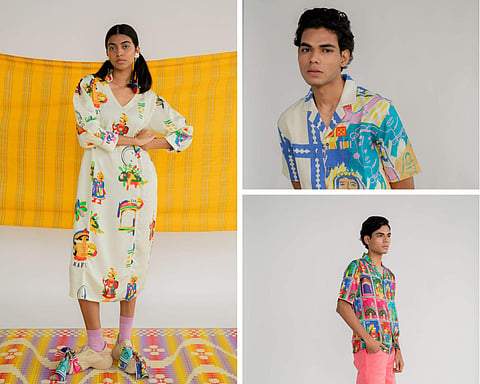
- LIFESTYLE
- FASHION
- FOOD
- ENTERTAINMENT
- EVENTS
- CULTURE
- VIDEOS
- WEB STORIES
- GALLERIES
- GADGETS
- CAR & BIKE
- SOCIETY
- TRAVEL
- NORTH EAST
- INDULGE CONNECT

As a Gen Z born, hitting the rewind button on our videos and reels has become a way of revisiting the memories we make on any trip. Unlike our parents or grandparents, who brought home a variety of stamps, coins and other memorabilias one can think of when travelling; for Indian women, one such souvenir is taking home a beautiful sari from every state she visits. This week, we catch up with Shaishavi Mehta, a designer who creates contemporary and quirky pieces of clothing using India’s heritage textiles, whose streetwear brand Rafu’d is inspired by her mother’s sari collection and apparel with narratives connected to them.
Origin story
The Gujarat-based brand’s latest collection is now available at the multi-designer clothing store, The Verandah. To get more insights about the same, we spoke to the fashion designer. “Throughout our history, we see that our ancestors used textiles as a medium of storytelling. To this day, India is abundant in fabrics that narrate tales from mythology and folklore,” she begins, adding, “Rafu’d, which comes from the Urdu word ‘rafu’ means mending or patching a garment or the gap between the old narrative, historical textiles and contemporary fashion.” And their new clothing edit, Chaap Katha, promises exactly that.
One among Rajasthan’s bounty of traditions, history and varied folk art forms is phad painting.
The 700-year-old unique art form is a type of scroll painting that was created as travelling or mobile temples, which were carried by bhopas and bhopis (priest-singers) of the Rabari tribe, who would sing and perform religious stories of local deities. Chaap Katha, which translates to printed stories, brings these fables narrated for centuries to the fore through their apparel that boasts vibrant illustrations, prints and patchwork. “The collection is an amalgamation of Gujarati elements like vibrant colours and illustrations of figurines found in the 20 metres long phad scrolls. Back then, Rabaris were a nomadic tribe, who did not have a temple and therefore these scrolls were unrolled after sunset and the tales in them would be performed in front of villagers.”
What's in store
The collection of 33 pieces boasts over six variants, the names of which are derived from Gujarati, created from biodegradable tencel and hand-woven, organic Kutch fabrics like kala cotton. The collection includes the sikka print, which translates to stamps. The dresses and shirts from this variant are covered in stamps that feature illustrations of figurines from the phad paintings. “The story of stamps originated from the fact that Rabaris were a travelling tribe and that’s when the thought of combining phad paintings and stamps struck me,” she reveals. All the artwork, from the stamps to the deities are digitally drawn by Shaishavi herself when she visited a museum in Rajasthan to get a closer look at the phad paintings.
Chaap Katha also boasts a chitra print that overlaps doodles. Litiyo, which means lines and stripes, is inclined more towards the Rabari patchwork and embroidery. The kinaar variant of the edit features woven fabrics that come with fringe detail while the Ardh print has stripe pattern on one side and a collage of doodles on the other. Bindu trousers, crafted from hand-woven fabrics in dots, stripes and plaid pattern, is detailed with tiered conch-shell waistbands. “We have used 12 main colours for the collection. The hues have been picked from the photos I clicked when I visited Rajasthan and these bright shades are also observed during Navratri in Gujarat,” she shares. One can shop for front-tied bralette tops, printed and embroidered corsets, wrap skirts, chic trousers, woven blazers, jackets with fringe detailing, doodled-shirts and more from this colourful edit catering to both men and women.
Up next
The label will soon be launching a fresh collection inspired by Gujarat's handmade textile mata ni pachedi, which was created by Vaghari nomads, and is used as a wall art in the shrines of goddess Durga. The edit will boast darker tones, block prints and tie-dye art.
₹2,800 onwards. At Halasuru.